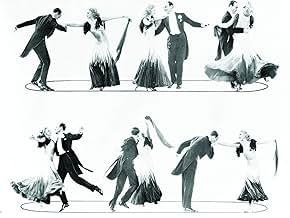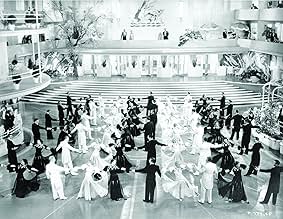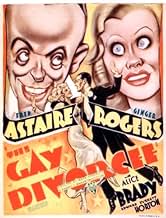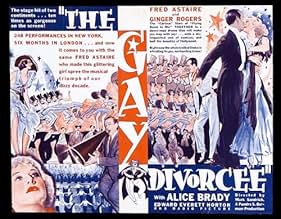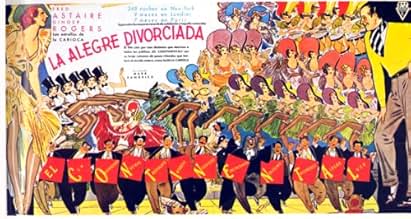VALUTAZIONE IMDb
7,3/10
9137
LA TUA VALUTAZIONE
Aggiungi una trama nella tua linguaA woman thinks a flirting man is the co-respondent her lawyer has hired to expedite her divorce.A woman thinks a flirting man is the co-respondent her lawyer has hired to expedite her divorce.A woman thinks a flirting man is the co-respondent her lawyer has hired to expedite her divorce.
- Regia
- Sceneggiatura
- Star
- Vincitore di 1 Oscar
- 4 vittorie e 5 candidature totali
Norman Ainsley
- Undetermined Role
- (non citato nei titoli originali)
Jimmy Aubrey
- Undetermined Role
- (non citato nei titoli originali)
Finis Barton
- Undetermined Role
- (non citato nei titoli originali)
Eleanor Bayley
- Dancer
- (non citato nei titoli originali)
De Don Blunier
- Chorus Girl
- (non citato nei titoli originali)
Pokey Champion
- Dancer
- (non citato nei titoli originali)
Jack Chefe
- Night Club Patron
- (non citato nei titoli originali)
Recensioni in evidenza
Following an apparently accidental teaming in 1933's Flying Down to Rio (a fun Dolores Del Rio vehicle), Fred and Ginger got their first starring feature a year later. It was based on J. Hartley Manners' play 'The Gay Divorce'. The Hays Office insisted on shoving an 'e' on the end, for how could a divorce be so trifling as to be gay? Some UK prints still run with the original title. RKO assembled a sparkling ensemble cast of top-flight farceurs, bringing together (in ascending order of sublimity) Eric Blore, Edward Everett Horton and Erik Rhodes ("Are you a union man?"). Mark Sandrich directs the thing with a maximum of fuss and style. Hermes Pan helped Fred choreograph the numbers.
The plot is suitably - and delightfully - trivial. Musical star Guy Holden (Fred) happens upon a girl (Ginger), falls desperately in love with her, then spends the rest of the picture trying to free himself from marvellously silly plot threads and Everett Horton's exquisite quadruple-takes.
Keeping just one song from Cole Porter's original score, the timeless 'Night and Day', and adding only four others, The Gay Divorcée is more a comedy with songs than it is a musical comedy. But what comedy - and what songs! 'Looking For a Needle in a Haystack' is a masterpiece of economy: Fred a whirlwind of frustrated, lovestruck energy as he spins around his hotel room lamenting his missing love in peerless style. "Men don't pine," he memorably concludes, "Women pine. Men ... suffer." Everett Horton's rare excursion into song-and-dance territory is a breath of hysterical, liberating ludicrousness, as he knocks knees with a young Betty Grable. 'Don't Let It Bother You', performed by a chorus of dancing girls (and dolls), then spectacularly reprised by a tapping Astaire, is another treat. 'The Continental', the film's vast production number is peculiarly edited but sporadically fine and offers a fitting climax.
It's exceptional fluff, the sort of heady, heightened escapism that you don't come close to very often. An extravagantly mounted, joyous comedy played to perfection by two stars at their irresistible peak. Unmissable.
The plot is suitably - and delightfully - trivial. Musical star Guy Holden (Fred) happens upon a girl (Ginger), falls desperately in love with her, then spends the rest of the picture trying to free himself from marvellously silly plot threads and Everett Horton's exquisite quadruple-takes.
Keeping just one song from Cole Porter's original score, the timeless 'Night and Day', and adding only four others, The Gay Divorcée is more a comedy with songs than it is a musical comedy. But what comedy - and what songs! 'Looking For a Needle in a Haystack' is a masterpiece of economy: Fred a whirlwind of frustrated, lovestruck energy as he spins around his hotel room lamenting his missing love in peerless style. "Men don't pine," he memorably concludes, "Women pine. Men ... suffer." Everett Horton's rare excursion into song-and-dance territory is a breath of hysterical, liberating ludicrousness, as he knocks knees with a young Betty Grable. 'Don't Let It Bother You', performed by a chorus of dancing girls (and dolls), then spectacularly reprised by a tapping Astaire, is another treat. 'The Continental', the film's vast production number is peculiarly edited but sporadically fine and offers a fitting climax.
It's exceptional fluff, the sort of heady, heightened escapism that you don't come close to very often. An extravagantly mounted, joyous comedy played to perfection by two stars at their irresistible peak. Unmissable.
Fred and Ginger, two perfect partners, two of the best dancers in history. In 1934, the toast of RKO. What a great pair the studio that would become defunct in a matter of years had on their hands!
In 1933, the pair had proven themselves as second leads in "Flying Down to Rio", a musical heavily relying on special effects and little else. They stole the show, proven with "The Carioca", the erotically charged dance number which started an American craze of pressing foreheads and even got the Best Song Oscar nod over the supposed show stopping title song. Before, Ginger had "42nd Street" to her name, while Fred had the famous screen test analysis of "Can't sing. Can't act. Can dance a little."
"The Gay Divorcee" is the establishing musical of Astaire and Rogers. Silly, dated, slight, even stupid to a certain degree is the entire story. Without a doubt, high comedy and immense creativity make up for it. The mistaken identity plot was recycled for "Top Hat" the following year, but it hardly matters. It is littered entirely with hilarity! Writing was never the strongest point of these musicals anyway. The performances were not Oscar calibre but they were publicly loved, and it's obviously Astaire and Roger's singing, acting and most of all, dancing, that makes the movie what it is.
A top wealth of talent was assembled for the movie. Erik Rhodes is absolutely side splitting as the Italian guy Tonetti, wielding the fabulous line, "Your wife is safe with Tonetti, he prefers spaghetti!". Alice Brady is there as Aunt Hortense, but Edward Everett Horton is another stand out performer as the lawyer. His fumbling voice provides a character of clumsiness and two seem to go hand in hand. He was definitely one of the best supporting comedians of the 1930s and 1940s, in other Astaire and Rogers musicals, and movies like "Lost Horizon", "Holiday", "Here Comes Mr Jordan" and "Arsenic and Old Lace".
Only one song was retained for the filmic version of "The Gay Divorcee". The censors even crashed down on the stage's original title "The Gay Divorce". Fred performs a great rendition of the immortal Cole Porter song "Night and Day". "The Continental", the Best Song of 1934 is thrown there in the mix too. Other great numbers in there include "Looking for a needle in a haystack", "Don't Let it Bother You" and "Let's K-nock- K-nees". The latter is performed by a young Betty Grable. This is notable for the only time Edward Everett Horton sings and dances on screen. We can see from the results there's an obvious reason.
The stylish period of courtship and even set decoration and costumes evoke great memories of eras gone by. RKO hasn't helped preservation of these technical elements by throwing what always appears to be mediocre sets, but it doesn't matter anyway. The whole thing is irresistible, spectacular and unforgettable. This is one of the forgotten musicals of the time which has it all.
Rating: 8/10
In 1933, the pair had proven themselves as second leads in "Flying Down to Rio", a musical heavily relying on special effects and little else. They stole the show, proven with "The Carioca", the erotically charged dance number which started an American craze of pressing foreheads and even got the Best Song Oscar nod over the supposed show stopping title song. Before, Ginger had "42nd Street" to her name, while Fred had the famous screen test analysis of "Can't sing. Can't act. Can dance a little."
"The Gay Divorcee" is the establishing musical of Astaire and Rogers. Silly, dated, slight, even stupid to a certain degree is the entire story. Without a doubt, high comedy and immense creativity make up for it. The mistaken identity plot was recycled for "Top Hat" the following year, but it hardly matters. It is littered entirely with hilarity! Writing was never the strongest point of these musicals anyway. The performances were not Oscar calibre but they were publicly loved, and it's obviously Astaire and Roger's singing, acting and most of all, dancing, that makes the movie what it is.
A top wealth of talent was assembled for the movie. Erik Rhodes is absolutely side splitting as the Italian guy Tonetti, wielding the fabulous line, "Your wife is safe with Tonetti, he prefers spaghetti!". Alice Brady is there as Aunt Hortense, but Edward Everett Horton is another stand out performer as the lawyer. His fumbling voice provides a character of clumsiness and two seem to go hand in hand. He was definitely one of the best supporting comedians of the 1930s and 1940s, in other Astaire and Rogers musicals, and movies like "Lost Horizon", "Holiday", "Here Comes Mr Jordan" and "Arsenic and Old Lace".
Only one song was retained for the filmic version of "The Gay Divorcee". The censors even crashed down on the stage's original title "The Gay Divorce". Fred performs a great rendition of the immortal Cole Porter song "Night and Day". "The Continental", the Best Song of 1934 is thrown there in the mix too. Other great numbers in there include "Looking for a needle in a haystack", "Don't Let it Bother You" and "Let's K-nock- K-nees". The latter is performed by a young Betty Grable. This is notable for the only time Edward Everett Horton sings and dances on screen. We can see from the results there's an obvious reason.
The stylish period of courtship and even set decoration and costumes evoke great memories of eras gone by. RKO hasn't helped preservation of these technical elements by throwing what always appears to be mediocre sets, but it doesn't matter anyway. The whole thing is irresistible, spectacular and unforgettable. This is one of the forgotten musicals of the time which has it all.
Rating: 8/10
After their hit dancing of the "Carioca" in "Flying Down the Rio," RKO gave the teaming of Fred Astaire and Ginger Rogers a star role in "The Gay Divorcée" in 1934.
With few exceptions, the plots of the Fred-Ginger films were excuses to get to the important part - the dancing - but the story lines were always pleasant and the casting good.
"The Gay Divorcée" was based on a Broadway musical (of which the only number retained is "Night and Day") and it appears that a few of its plot devices were adopted in later Astaire-Rogers films as well.
One such plot device is that of mistaken identity. In this movie, Astaire (reprising his Broadway role) is mistaken for a professional correspondent hired to help Rogers get her divorce. Another device is that at first, Ginger is never interested in Fred - that goes here, too.
And there's a stock cast in these films, namely, Edward Everett Horton and Eric Blore (and of course, he's always the butler and always very funny). Horton plays Rogers' attorney whose major problem is Rogers' aunt (Alice Brady).
What can be said about the dancing except that it's glorious? Fred and Ginger dance to "Night and Day" after Astaire sings it to her. For a supposed non-singer, Astaire could really put over a song - his voice is pleasant and he's so musical - no wonder composers wrote songs for him.
Ginger is beautiful and spunky as Mimi, a young woman ducking Fred while she's trying to get a divorce. Betty Grable has a bit that showcases her in the number "Let's K-knock Kneez." There's also "I'm Looking for a Needle in a Haystack" delightfully sung and danced by Fred. Astaire's dancing is fantastic throughout.
It feels as if about half the picture is taken up with the elaborately staged production number, "The Continental." In later films, of course, the dancing would center more around Fred and Ginger, but it's a great part of the movie and certainly solidified these two as a top box office pairing.
For pure enjoyment, there's nothing like watching Astaire & Rogers in these movies.
With few exceptions, the plots of the Fred-Ginger films were excuses to get to the important part - the dancing - but the story lines were always pleasant and the casting good.
"The Gay Divorcée" was based on a Broadway musical (of which the only number retained is "Night and Day") and it appears that a few of its plot devices were adopted in later Astaire-Rogers films as well.
One such plot device is that of mistaken identity. In this movie, Astaire (reprising his Broadway role) is mistaken for a professional correspondent hired to help Rogers get her divorce. Another device is that at first, Ginger is never interested in Fred - that goes here, too.
And there's a stock cast in these films, namely, Edward Everett Horton and Eric Blore (and of course, he's always the butler and always very funny). Horton plays Rogers' attorney whose major problem is Rogers' aunt (Alice Brady).
What can be said about the dancing except that it's glorious? Fred and Ginger dance to "Night and Day" after Astaire sings it to her. For a supposed non-singer, Astaire could really put over a song - his voice is pleasant and he's so musical - no wonder composers wrote songs for him.
Ginger is beautiful and spunky as Mimi, a young woman ducking Fred while she's trying to get a divorce. Betty Grable has a bit that showcases her in the number "Let's K-knock Kneez." There's also "I'm Looking for a Needle in a Haystack" delightfully sung and danced by Fred. Astaire's dancing is fantastic throughout.
It feels as if about half the picture is taken up with the elaborately staged production number, "The Continental." In later films, of course, the dancing would center more around Fred and Ginger, but it's a great part of the movie and certainly solidified these two as a top box office pairing.
For pure enjoyment, there's nothing like watching Astaire & Rogers in these movies.
The Gay Divorcée is the answer to the trivia question of which of Fred Astaire's and Ginger Rogers's is one that Fred Astaire had previously done on Broadway. When Astaire did it on Broadway, the Cole Porter musical had been entitled The Gay Divorce. But that extra 'e' was added on lest anyone get the idea that divorce itself was something frivolous. Imagine anticipating Britney Spears by about 70 years.
Actually Fred had also done Funny Face and The Bandwagon on stage as well. But on stage The Bandwagon was a revue and Funny Face had an entirely different plot than the musical made by Astaire in the Fifties. Only in The Gay Divorcée was he asked to repeat a stage role.
The basic plot is still the same, the usual Astaire-Rogers case of mistaken identity. Ginger is the budding divorcée going to London to get a divorce as Aunt Alice Brady hired a professional co-respondent. Ginger mistakes Fred for that co-respondent and it takes a while for Fred to warm her up.
Fred's an American musical comedy star visiting London with his manager Edward Everett Horton who also happens to know Brady. This gives the excuse for the musical numbers.
Cole Porter's score was cut completely from the screen other than the immortal Night and Day. In it's place came four songs, three written by Harry Revel&Mack Gordon and one written by Con Conrad&Herb Magdison. Fred and Ginger dance divinely to Night and Day.
Fred does a solo dance to A Needle in a Haystack and Don't Let It Bother You. Betty Grable got her first notice from the movie going public, singing and dancing in Let's Knock Knees all of which were contributed by Revel&Gordon.
But it was The Continental number by Con Conrad and Herbert Magdison that got the first Academy Award ever given out for Best Original Song in a motion picture. It's what The Gay Divorcée is remembered for today. It's a rather long, between ten and fifteen minutes of screen time, but as magical as ever
The Gay Divorce ran for 248 performances on Broadway during the 1932- 1933 season. Sacrificed for romance are Porter's witty lyrics in the rest of the score containing their usual commentary on the social scene. Of all the American musical giants of the era, I would say that Cole Porter wins hands down as the man that Hollywood butchered the most in bringing his work to the screen. Even before The Code was in place, it seemed that the powers that be deemed that his work was way too sophisticated and naughty to be seen and heard as is.
Still with the film being frothy romance instead of social commentary, The Gay Divorcée is still great entertainment. Also repeating their roles from Broadway are supercilious waiter Eric Blore and the real co-respondent Tonetti who prefers spaghetti, Erik Rhodes.
Wit for romance, you decide if it was a fair exchange.
Actually Fred had also done Funny Face and The Bandwagon on stage as well. But on stage The Bandwagon was a revue and Funny Face had an entirely different plot than the musical made by Astaire in the Fifties. Only in The Gay Divorcée was he asked to repeat a stage role.
The basic plot is still the same, the usual Astaire-Rogers case of mistaken identity. Ginger is the budding divorcée going to London to get a divorce as Aunt Alice Brady hired a professional co-respondent. Ginger mistakes Fred for that co-respondent and it takes a while for Fred to warm her up.
Fred's an American musical comedy star visiting London with his manager Edward Everett Horton who also happens to know Brady. This gives the excuse for the musical numbers.
Cole Porter's score was cut completely from the screen other than the immortal Night and Day. In it's place came four songs, three written by Harry Revel&Mack Gordon and one written by Con Conrad&Herb Magdison. Fred and Ginger dance divinely to Night and Day.
Fred does a solo dance to A Needle in a Haystack and Don't Let It Bother You. Betty Grable got her first notice from the movie going public, singing and dancing in Let's Knock Knees all of which were contributed by Revel&Gordon.
But it was The Continental number by Con Conrad and Herbert Magdison that got the first Academy Award ever given out for Best Original Song in a motion picture. It's what The Gay Divorcée is remembered for today. It's a rather long, between ten and fifteen minutes of screen time, but as magical as ever
The Gay Divorce ran for 248 performances on Broadway during the 1932- 1933 season. Sacrificed for romance are Porter's witty lyrics in the rest of the score containing their usual commentary on the social scene. Of all the American musical giants of the era, I would say that Cole Porter wins hands down as the man that Hollywood butchered the most in bringing his work to the screen. Even before The Code was in place, it seemed that the powers that be deemed that his work was way too sophisticated and naughty to be seen and heard as is.
Still with the film being frothy romance instead of social commentary, The Gay Divorcée is still great entertainment. Also repeating their roles from Broadway are supercilious waiter Eric Blore and the real co-respondent Tonetti who prefers spaghetti, Erik Rhodes.
Wit for romance, you decide if it was a fair exchange.
This was the first RKO film that Fred Astaire and Ginger Rogers did in which they are the central characters. In the first two they play wise cracking supporting roles, and if you don't know what is going on you might say "Hey, why don't Gene Raymond and Delores Del Rio get out of the way and let Fred and Ginger do their stuff?". It was because Fred and Ginger as a team were a bit of a surprise to RKO.
At any rate, like I said, this seems like a warm up for "Top Hat" a year later, but it is still a great film. But the two share a few pieces of the basic formula. Fred and Ginger meet in such a way that annoys Ginger and gets Fred interested, and once Ginger begins to return Fred's affection a complete misunderstanding that Fred knows nothing about causes Ginger to lose all interest in a now confused Fred. Edward Everett Horton plays Fred's loyal but befuddled friend, and Eric Blore, who at first seems like a minor character who is in the film mainly to flummox Horton's character plays a much bigger part in the plot than you would ever imagine. Erik Rhodes plays an Italian who never really has a chance as third vertex in a triangle in which the other two are Fred and Ginger, but he plays that part with great comic style.
A couple of mistakes fixed by "Top Hat" that this one has - First, Fred Astaire is given no solo dance numbers. Second, too much Alice Brady can get annoying. In "Top Hat" her part is taken by Helen Broderick who had a great dry comic wit.
Still, highly recommended.
At any rate, like I said, this seems like a warm up for "Top Hat" a year later, but it is still a great film. But the two share a few pieces of the basic formula. Fred and Ginger meet in such a way that annoys Ginger and gets Fred interested, and once Ginger begins to return Fred's affection a complete misunderstanding that Fred knows nothing about causes Ginger to lose all interest in a now confused Fred. Edward Everett Horton plays Fred's loyal but befuddled friend, and Eric Blore, who at first seems like a minor character who is in the film mainly to flummox Horton's character plays a much bigger part in the plot than you would ever imagine. Erik Rhodes plays an Italian who never really has a chance as third vertex in a triangle in which the other two are Fred and Ginger, but he plays that part with great comic style.
A couple of mistakes fixed by "Top Hat" that this one has - First, Fred Astaire is given no solo dance numbers. Second, too much Alice Brady can get annoying. In "Top Hat" her part is taken by Helen Broderick who had a great dry comic wit.
Still, highly recommended.
Lo sapevi?
- QuizThe musical number "The Continental" lasts 17 1/2 minutes, the longest number ever in a musical until Gene Kelly's 18 1/2-minute ballet at the end of Un americano a Parigi (1951) 17 years later. It is also the longest musical number in all of Fred Astaire and Ginger Rogers' films together.
- BlooperDuring the car chase, Guy makes a quick turn on a dirt road, and a sound effect of squealing tires is heard. Tires do not make a squealing noise on dirt.
- Citazioni
Tonetti: [unable to remember his passphrase "Chance is a fool's name for fate," Tonettie repeatedly muffs it] Chance is the foolish name for fate. / Give me a name for chance and I am a fool. / Fate is a foolish thing to take chances with. / I am a fate to take foolish chances with. / Chances are that fate is foolish. / Fate is the foolish thing. Take a chance.
- Versioni alternativeIn the version of the movie released in Brazil in the 1930s, the Brazilian actor Raul Roulien sang in the musical number "The Continental".
- ConnessioniEdited into L'ora del destino (1942)
- Colonne sonoreDon't Let It Bother You
(1934)
Music and Lyrics by Mack Gordon and Harry Revel
Dance performed by Fred Astaire
I più visti
Accedi per valutare e creare un elenco di titoli salvati per ottenere consigli personalizzati
- How long is The Gay Divorcee?Powered by Alexa
Dettagli
- Data di uscita
- Paese di origine
- Sito ufficiale
- Lingue
- Celebre anche come
- La alegre divorciada
- Luoghi delle riprese
- Santa Monica, California, Stati Uniti(Exterior)
- Azienda produttrice
- Vedi altri crediti dell’azienda su IMDbPro
Botteghino
- Budget
- 520.000 USD (previsto)
- Lordo in tutto il mondo
- 6879 USD
- Tempo di esecuzione
- 1h 47min(107 min)
- Colore
- Proporzioni
- 1.37 : 1
Contribuisci a questa pagina
Suggerisci una modifica o aggiungi i contenuti mancanti



